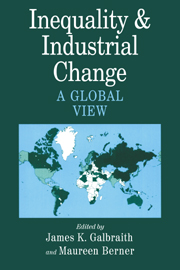Book contents
- Frontmatter
- Contents
- Contributors
- Permissions
- Acknowledgments
- PART I INTRODUCTION TO THEORY AND METHOD
- PART II INEQUALITY, UNEMPLOYMENT, AND INDUSTRIAL CHANGE
- PART III INEQUALITY AND DEVELOPMENT
- 7 Toward a New Kuznets Hypothesis: Theory and Evidence on Growth and Inequality
- 8 Measuring the Evolution of Inequality in the Global Economy
- 9 Economic Regionalization, Inequality, and Financial Crises
- 10 Inequality and State Violence: A Short Report
- 11 Grading the Performance of Latin American Regimes, 1970–1995
- 12 The Evolution of Industrial Earnings Inequality in Mexico and Brazil
- 13 The Legacy of the HCI: An Empirical Analysis of Korean Industrial Policy
- 14 Inequality and Economic Development: Concluding Reflections
- PART IV METHODS AND TECHNIQUES
- Data Appendix
- References and Selected Bibliography
- Index
7 - Toward a New Kuznets Hypothesis: Theory and Evidence on Growth and Inequality
Published online by Cambridge University Press: 05 June 2012
- Frontmatter
- Contents
- Contributors
- Permissions
- Acknowledgments
- PART I INTRODUCTION TO THEORY AND METHOD
- PART II INEQUALITY, UNEMPLOYMENT, AND INDUSTRIAL CHANGE
- PART III INEQUALITY AND DEVELOPMENT
- 7 Toward a New Kuznets Hypothesis: Theory and Evidence on Growth and Inequality
- 8 Measuring the Evolution of Inequality in the Global Economy
- 9 Economic Regionalization, Inequality, and Financial Crises
- 10 Inequality and State Violence: A Short Report
- 11 Grading the Performance of Latin American Regimes, 1970–1995
- 12 The Evolution of Industrial Earnings Inequality in Mexico and Brazil
- 13 The Legacy of the HCI: An Empirical Analysis of Korean Industrial Policy
- 14 Inequality and Economic Development: Concluding Reflections
- PART IV METHODS AND TECHNIQUES
- Data Appendix
- References and Selected Bibliography
- Index
Summary
Simon Kuznets proposed a broad hypothesis on the process of development: that economic progress is accompanied by increasing inequality in the early stages of industrialization, which then tends to decline as industrialization deepens. Recent empirical tests of the Kuznets hypothesis have raised questions about this conjecture, yet most of these studies are based on limited and deficient data. Here we examine the dynamics of inequality across the Organization for Economic Cooperation and Development (OECD) using methods that allow the construction of long and dense time series of inequality. We find that an augmented Kuznets curve for developed countries, where inequality increases with income growth for the highest-income countries, is consistent with this data set. Thus, we offer a macroeconomic alternative to the skill-biased technological change hypothesis, which has been dominant in the literature as an explanation for increasing inequality.
For the study of the economic growth of nations, it is imperative that we become more familiar with findings in those related social disciplines that can help us understand population growth patterns, the nature and forces in technological change, the factors that determine the characteristics and trends in political institutions. … Effective work in [the field of economic growth, inequality, and technology] necessarily calls for a shift from market economics to political and social economy.
Kuznets (1955:28)- Type
- Chapter
- Information
- Inequality and Industrial ChangeA Global View, pp. 139 - 160Publisher: Cambridge University PressPrint publication year: 2001
- 12
- Cited by



